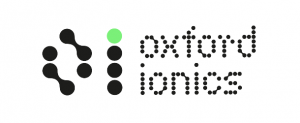Quantum News Briefs January 10: Oxford Ionics raises $36.5M Series A funding; Singapore-based Abelian striving to make blockchain safe for post-quantum future; Quantum Sensors in Germany + MORE

Quantum News Briefs January 10 begins with news that Oxford Ionics raises $36.5M Series A funding; followed by Singapore-based Abelian striving to make blockchain safe for post-quantum future; Quantum Sensors in Germany + MORE
*****
Quantum startup Oxford Ionics raises $36.5M Series A funding
 Oxford Ionics has announced the acquisition of £30 million (US$36.5 million) in Series A funding from a round led by Oxford Science Enterprises and Braavos Investment Advisers. Lansdowne Partners, Prosus Ventures, 2xN, Torch Partners and Hermann Hauser (founder of chip giant ARM) also participated. Quantum News Briefs summarizes the announcement below.
Oxford Ionics has announced the acquisition of £30 million (US$36.5 million) in Series A funding from a round led by Oxford Science Enterprises and Braavos Investment Advisers. Lansdowne Partners, Prosus Ventures, 2xN, Torch Partners and Hermann Hauser (founder of chip giant ARM) also participated. Quantum News Briefs summarizes the announcement below.
Oxford Ionics’ trapped-ion technology holds world records for the highest performance quantum operations, longest quantum coherence time, and highest performance quantum network. Importantly, the company has shown that it can maintain this performance using chips manufactured on a semiconductor production line.
Oxford Ionics’ record-breaking performance stems from its pioneering approach. Until now, trapped-ion systems have largely relied on lasers to control qubits. This approach performs well for small processors, but becomes untenable and error-prone as the size of the processor scales, and the number of qubits increases.
Instead of lasers, Oxford Ionics’ trapped-ion processors use a proprietary, patented Electronic Qubit Control (EQC) system to control the qubits. This allows for the combination of the unrivalled quantum performance of individual atoms with the scalability and reliability of electronics integrated into silicon chips.
Not only does this approach deliver the highest level of performance possible, it does so in a way that makes the Oxford Ionics processors integrable and scalable as standard. Oxford Ionics has proven the potential of this approach in a real-world environment, producing its quantum processors in a standard semiconductor foundry through its partnership with Infineon Technologies AG.
Click here to read announcement in-entirety.
*****
Singapore-based Abelian striving to make blockchain safe for post-quantum future
 A group of cryptographers and mathematicians from a Singapore-based project called Abelian has created the world’s first L1 post-quantum blockchain, along with its own privacy preserving cryptocurrency. David Thompson of TechTimes is the author of a comprehensive article detailing the need for quantum-resistant systems and the efforts of Abelian to safeguard the blockchain. Quantum News Briefs summarizes below with an emphasis on the efforts of Abelian.
A group of cryptographers and mathematicians from a Singapore-based project called Abelian has created the world’s first L1 post-quantum blockchain, along with its own privacy preserving cryptocurrency. David Thompson of TechTimes is the author of a comprehensive article detailing the need for quantum-resistant systems and the efforts of Abelian to safeguard the blockchain. Quantum News Briefs summarizes below with an emphasis on the efforts of Abelian.
Abelian’s core cryptographic systems make use of lattice-based technology and are provably secure in strong security models that capture most of the attacks that could be feasibly launched with a quantum computer. Lattice-based cryptographic constructions are the leading candidates for post-quantum public-key cryptography, representing three of the four finalists in NIST’s PQcrypto standardization project.
Abelian has already established a strategic partnership with Draper Dragon, a cross-border venture fund that looks for early-stage companies capable of disrupting their industry landscape, and the project is expanding rapidly.
The mainnet for Abelian’s cryptocurrency, ABEL, was launched in March of 2022 with four nodes. By July, it had expanded to 400 full nodes, with miners from all over the world. The number of mining sites had increased to 3,000 as of October, with miners continuously adding more computational power to Abelian’s mainnet, and mining difficulty doubling every 10 days.
In the near future, Abelian plans to introduce an EVM-equivalent L2 chain for smart contract support. Closing comments note that by 2023, all of the project’s source code will be made fully open source, as the project aims to build an open community that can continuously improve Abelian’s security, scalability, and decentralization, while promoting the growth of the Abelian ecosystem. Click here to read the TechTimes article in-entirety.
RELATED: See Inside Quantum Technology’s Research Report: The Quantum Threat to Blockchain: Emerging Business Opportunities for in-depth analysis of the challenges and opportunities that arise from the threat that quantum computers pose to the “blockchain” mechanism.
*****
Quantum Sensors in Germany
 The Fraunhofer IAF is at the core of Germany’s quantum sensor push. Robert Lea is the author of a “Regional Spotlight” article in AZO Sensors focusing on Germany’s funding and successful developments in quantum sensors. Quantum News Briefs summarizes.
The Fraunhofer IAF is at the core of Germany’s quantum sensor push. Robert Lea is the author of a “Regional Spotlight” article in AZO Sensors focusing on Germany’s funding and successful developments in quantum sensors. Quantum News Briefs summarizes.
The German institute pursues the visualization of individual bits in electronic storage media and the investigation of brain magnetic fields to control machines with thoughts using a foundation of quantum sensor technology.
Fraunhofer IAF develops diamond-based quantum sensors capable of detecting magnetic and electric fields with a nanometer-scale resolution down to individual electrons and their nuclear spins — the quantum equivalent of angular momentum. The company states that combining quantum sensor technology with diamond could significantly contribute to rapidly moving quantum tech from the laboratory stage testing stage to real-world applications.
The work of Fraunhofer IAF in the quantum tech field is vast; one of its most significant developments came in June 2022. Midway through 2022, Fraunhofer IAF announced a milestone in quantum sensor technology, measuring magnetic-field-dependent stimulated emission using a diamond with a high density of nitrogen-vacancy centers in a laser system.
Q.ANT is a wholly owned subsidiary of German high-tech company TRUMPF based in Ditzingen near Stuttgart. In May 2022, the company demonstrated the world’s first industrial-grade quantum sensors. This showcase included the demonstration of particle sensors capable of measuring particles in gases, liquids, and powders to a sensitivity far beyond the capability of current measuring technology.
Away from Earth’s surface, quantum sensors can have important applications in the next era of space exploration, as demonstrated by the collaboration between Q.ANT, Bosch, TRUMPF, and the German Aerospace Center (DLR). In August 2022, these German organizations announced their intention to use quantum technology to enhance satellite measurement stability.
Lea also details the German government’s overall funding of quantum technologies. In May 2021, the German Federal Government announced its intention to invest €2 billion into quantum technologies over a time period lasting until 2026. The education and research ministry has committed €1.1 billion to quantum research and development by 2025, while Germany’s economy ministry has pledged to contribute €878 million to develop applications for quantum technologies. Click here to read comprehensive, complete article.
*****
Japan sets goal to increase number of users of quantum technology-related services to 10 million in 2030
 Japanese electronics and other firms have been engaged in research into quantum computers, which would vastly surpass the calculating power of supercomputers. NHK World Japan recently commented on quantum computing in Japan; Quantum News Briefs summarizes below.
Japanese electronics and other firms have been engaged in research into quantum computers, which would vastly surpass the calculating power of supercomputers. NHK World Japan recently commented on quantum computing in Japan; Quantum News Briefs summarizes below.
They are currently trying to make actual use of the quantum technologies developed during the research process. The Japanese government has set a goal of increasing the number of users of quantum technology-related services to 10 million in 2030.
Industrial conglomerate Hitachi has created a system that can automatically assign shifts to more than 100 workers, reflecting their various work hours, plans for days off and the number of workers needed for each shift. Officials say it took over 11 hours for humans to create such a schedule, but the system does it in less than half that time. They say they hope to put it into practical use in fiscal 2023 or later.
Hitachi researcher Yamamoto Keisuke says he hopes the system will be applied to a wide range of sectors, including finance, manufacturing and railways.
Technology giant Fujitsu says that later this year it plans to start using an actual quantum computer developed with the Riken research institute. The firm says it will let businesses use the machine for research purposes. Click here to read NKH World article in-entirety.
*****
Sandra K. Helsel, Ph.D. has been researching and reporting on frontier technologies since 1990. She has her Ph.D. from the University of Arizona.



















